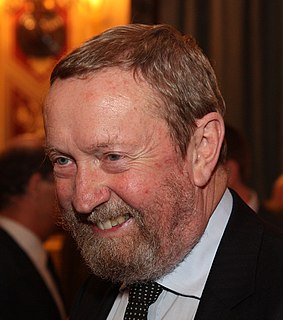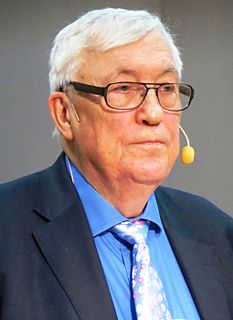A Quote by John Beddington
Can nine billion people be fed? Can we cope with the demands in the future on water? Can we provide enough energy? Can we do it, all that, while mitigating and adapting to climate change? And can we do all that in 21 years time? That's when these things are going to start hitting in a really big way. We need to act now. We need investment in science and technology, and all the other ways of treating very seriously these major problems. 2030 is not very far away
Quote Topics
Act
Adapting
Away
Big
Billion
Change
Climate
Climate Change
Cope
Demands
Energy
Enough
Far
Far Away
Fed
Future
Going
Hitting
Investment
Major
Major Problems
Need
Nine
Now
Other
People
Problems
Provide
Really
Science
Science And Technology
Seriously
Start
Technology
Things
Time
Treating
Very
Water
Way
Ways
While
Years
Related Quotes
I have felt for a long time that the pathway to solving the climate crisis is through the building of a massive grassroots army of men and women who will go out there and win the conversation on climate, and persuade businesses, and universities, and towns to switch to renewable energy and to reduce emissions. And the big change from ten years ago is that people are way more receptive, not only to the message that we have to act, not only to the message that now we can act, we have the solutions now - that's the biggest change - but also willing to make a commitment that we will act.
I think the best and perhaps only sensible policy for the future is to prepare society for change and be prepared to adjust. In 25 years, we'll have a world with some 9 to 10 billion people that will require twice as much primary energy as today. We must embrace new science and technology in a more positive way than we presently do in Europe. This includes, for example, nuclear energy and genetic food production to provide the world what it urgently needs.
The issue of climate change, it really does bring home the fact that we are on one planet, and that some of the impact of what human beings do in one corner of the world is going to affect people in a distant corner of the world. So we may still feel very far from each other, but we are really very close to each other because of the changes we have made with travel and technology and especially the information technology.
Every candidate running for president has got to answer the following very simple question: At a time when we need to address the planetary crisis of climate change, and transform our energy system away from fossil fuels and into energy efficiency and sustainability, should we continue to give $135 billion in tax breaks and subsidies over the next decade to fossil fuel companies?
So we really need jobs now. We have to take jobs away from other countries because other countries are taking our jobs. There is practically not a country that does business with the United States that isn't making - let's call it a very big profit. I mean China is going to make $300 billion on us at least this year.
We've got some great big problems in our world. We have to figure out how to feed 10 billion people. Too many people can't access clean water, quality healthcare, and reasonable education. We have to figure out what to do about climate change, income inequality, and more. Innovators need to rise to the challenge!
I think climate change is probably the most extreme, and it's been going on for years because it's very difficult to talk about a planetary issue like climate change and to get people who live within four-year electoral cycles to actually pay attention to something that you predict is happening way in the future.
While much of modern behavioral and social science treats individuals as autonomous agents, it is absolutely clear that the way we think and act is enormously influenced by the culture in which we live. It also is clear that the major elements of modern culture-science, technology, law, music, and religion-have evolved over time in a quite concrete sense of the term. Mesoudi makes these arguments very well and his book is a very good read.
Some global hazards are insidious. They stem from pressure on energy supplies, food, water and other natural resources. And they will be aggravated as the population rises to a projected nine billion by mid-century, and by the effects of climate change. An 'ecological shock' could irreversibly degrade our environment.
I think that for all of the dangers of technology spreading, I think it is more dangerous in some ways that it doesn't. My simple reason for that is we've got 7 billion people on the planet, and we have these very serious problems, and I think we don't know who's going to have the answers to the problems that are coming around the bend.
































